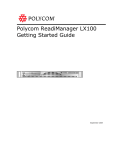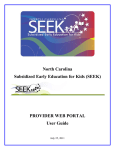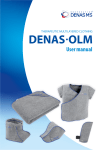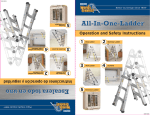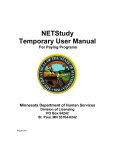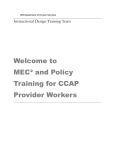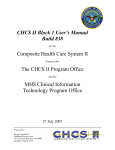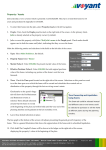Download 15-68-10 - Minnesota Department of Human Services
Transcript
Bulletin NUMBER #15-68-10 DATE July 31, 2015 OF INTEREST TO County Directors Tribal Directors Child Care Assistance Program Administrative and Client Access Contacts Child Care Assistance Program Provider Compliance Guidance TOPIC This bulletin gives guidance about actions related to child care payments authorized under Minnesota Statutes, section 119B.13, subdivision 6, paragraph (d). PURPOSE Provide policy and MEC² instructions to county and tribal workers. Child Care Aware Agencies County Attorneys Fraud Prevention Investigation (FPI) Supervisors CONTACT Contact your Child Care Assistance Program technical liaison or submit your questions through PolicyQuest. SIGNED FPI Investigators ACTION/DUE DATE Please read information and prepare for implementation EXPIRATION DATE JAMES G. KOPPEL Assistant Commissioner TERMINOLOGY NOTICE The terminology used to describe people we serve has changed over time. The Minnesota Department of Human Services (DHS) supports the use of "People First" language. July 31, 2017 Minnesota Department of Human Services · PO Box 64238 · St. Paul, MN 55164-0238 Bulletin #15-68-10 July 31, 2015 Page 2 I. Background and Introduction During the 2012 legislative session, Minnesota Statutes, section 119B.13, subdivision 6, paragraph (d) was changed. The changes allowed counties and tribes to refuse to issue a child care authorization, revoke an existing child care authorization, stop payments, or refuse to pay a bill during times when a child care provider is out of compliance with certain Child Care Assistance Program (CCAP) or licensing regulations. During the 2015 legislative session, additional changes were made to this paragraph. These changes, which are effective July 1, 2015, clarify policies and allow the Department of Human Services (the department) to take the same actions as county and tribal agencies under this paragraph. The department will notify agencies when instances like this arise. Although the department can take the same actions as county and tribal agencies under this paragraph, this bulletin focuses on county and tribal authority in this area. This bulletin provides specific guidance about actions that agencies (counties and tribes) and the department may take under each of the clauses outlined in Minnesota Statutes, section 119B.13, subdivision 6, paragraph (d). Additionally, it notifies agencies of changes to this section of statute that were adopted during the 2015 legislative session. II. Relevant Information Minnesota Statutes, section 119B.13, subdivision 6, paragraph (d), defines conditions that allow a county or tribe to refuse to issue a child care authorization, revoke an existing authorization, stop payment, or refuse to pay a bill under certain conditions. These policies are tools that help support program integrity. The department has previously issued several bulletins that address withholding provider authorizations or payments. • Bulletin #13-68-13 provided information and instructions to assist agency efforts to detect fraudulent child care payments, refer cases for investigation, and ensure that counties engage in collection efforts to recover those payments. • Bulletin #14-68-02 provided information and instructions to agencies about actions related specifically to child care payments authorized under Minnesota Statutes, section 119B.13, subdivision 6, paragraph (d), clause (4) when a provider license is suspended or revoked, but subject to or under appeal. • Bulletin #14-68-03 provided information about a legislative change effective 2/03/2014, which allows counties and tribes to withhold a provider’s authorization or payments for up to three months beyond the time that a condition outlined in Minnesota Statutes, section 119B.13, subdivision 6, paragraph (d) has been corrected. Minnesota Department of Human Services · PO Box 64238 · St. Paul, MN 55164-0238 Bulletin #15-68-10 July 31, 2015 Page 3 III. Action Required Counties and tribes should review this bulletin and consider changes to local agency policies and procedures. Counties or tribes may choose to adopt one or more of the policies and procedures described in this bulletin, but they are not required to adopt any of them. If an agency chooses to implement the policies described in this bulletin, the agency must consider how to consistently apply each policy within the options listed. Agencies must amend their County/Tribal Child Care Fund Plan prior to implementation. A. Understanding Policy Options Minnesota Statutes, section 119B.13, subdivision 6, paragraph (d) includes six separate clauses. Each clause defines a situation or condition that allows a county or tribe to refuse to issue a child care provider’s authorization, revoke an existing authorization, stop payment, or refuse to pay a bill. This bulletin focuses primarily on instances when agency staff may refuse to issue a child care authorization or revoke an existing authorization. “Authorization” refers to a provider’s registration, which allows them to receive payment in a county or tribe. If your agency has specific questions about stopping payment and/or refusing to pay a bill, consult with your technical liaison and your county attorney. B. Reasons for Denying or Closing a Provider Registration Implementation of Minnesota Statutes, section 119B.13, subdivision 6, paragraph (d), clauses (1) through (6) varies by clause. If a county or tribe chooses to implement a clause, agency workers must follow the steps for each clause as detailed in this bulletin. The length of time a provider’s registration can be closed under this section of statute varies depending on the reason for the closure. See Section III. D. of this bulletin for more information about how long agencies can withhold a provider’s registration. 1. Minnesota Statutes, section 119B.13, subdivision 6, paragraph (d), clause (1) Counties and tribes may refuse to issue a child care authorization, revoke an existing authorization, stop payment, or refuse to pay a bill when a provider admits to intentionally giving the agency materially false information on the provider’s billing forms. When providers sign billing forms, they certify that the child care billed is correct, and they acknowledge that if they give false information on the billing form, they “could be disqualified from receiving CCAP payment and could face civil penalties and/or criminal charges.” Minnesota Department of Human Services · PO Box 64238 · St. Paul, MN 55164-0238 Bulletin #15-68-10 July 31, 2015 Page 4 Providing materially false information means the false information given could have affected the amount of the CCAP payment. The agency must follow applicable procedures outlined in Section V. of this bulletin for completing a fraud referral, disqualifying the provider, and assessing overpayments. Once an Intentional Program Violation (IPV) is established, the provider is disqualified from receiving CCAP payments according to the timeframes outlined in CCAP Policy Manual §14.12.6 (Disqualification for Fraud Providers). 2. Minnesota Statutes, section 119B.13, subdivision 6, paragraph (d), clause (2) Counties and tribes may refuse to issue a child care authorization, revoke an existing authorization, stop payment, or refuse to pay a bill when the county finds a preponderance of evidence that the provider intentionally gave the county materially false information on the provider’s billing forms and/or attendance records. Clause (2) differs from clause (1) in two ways. • Clause (1) addresses situations when the provider admits to intentionally giving the county materially false information on the provider’s billing forms. Clause (2) deals with situations when the county finds, by a preponderance of evidence, that the provider intentionally gave the county materially false information on the provider’s billing forms. Preponderance of evidence means that when the evidence is considered, it is more likely than not that fraud occurred. • Effective July 1, 2015, clause (2) applies to situations when a provider submits false attendance records or billing forms. Clause (1) only applies to false information on their billing forms. The agency must follow applicable procedures outlined in Section V. of this bulletin for completing a fraud referral, disqualifying the provider, and assessing overpayments. Once an Intentional Program Violation (IPV) is established, the provider is disqualified from receiving CCAP payments according to the timeframes outlined in CCAP Policy Manual §14.12.6 (Disqualification for Fraud –Providers). Minnesota Department of Human Services · PO Box 64238 · St. Paul, MN 55164-0238 Bulletin #15-68-10 Date July 31, 2015 Page 5 3. Minnesota Statutes, section 119B.13, subdivision 6, paragraph (d), clause (3) Counties and tribes may refuse to issue a child care authorization, revoke an existing authorization, stop payment, or refuse to pay a bill when a provider is in violation of Child Care Assistance Program rules, until the agency determines the violations have been corrected. For the purpose of this clause, “Child Care Assistance Program rules” include policies outlined in: • Minnesota Statutes, Chapter 119B, • Minnesota Statutes, Chapter 245E, • Minnesota Rules, Chapter 3400, and • The Child Care Assistance Program (CCAP) Policy Manual. These may include, but are not limited to, the following situations: • When a provider fails to report child absent days when a child who receives CCAP has been absent for more than seven consecutive scheduled days; • When a provider fails to report that a child who receives CCAP stops attending care or is not attending; • Any unreported changes in initial information in the provider acknowledgment including the provider’s rate, charges for absences and holidays, any notice days required before a child discontinues care, and any required registration fees; • A legal nonlicensed (LNL) provider fails to report any and all changes that would require a new background study for the provider and/or member(s) of the provider’s household. Counties or tribes that amend their Child Care Plan for clause (3) must clearly define which CCAP rules they choose to implement, when rules are implemented, and how providers can demonstrate compliance with these rules. Minnesota Department of Human Services · PO Box 64238 · St. Paul, MN 55164-0238 Bulletin #15-68-10 Date July 31, 2015 Page 6 4. Minnesota Statutes, section 119B.13, subdivision 6, paragraph (d), clause (4) Counties and tribes may refuse to issue a child care authorization, revoke an existing authorization, stop payment, or refuse to pay a bill when a provider is operating after receipt of the following licensing notices: • An order of suspension; • An order of revocation; or • A final order of conditional license, for as long as the conditional license is in effect. Changes adopted during the 2015 legislative session, which are effective July 1, 2015, removed the option for counties and tribes to take action against providers that have been issued an order citing violations of licensing standards that affect the health and safety of children in care due to the nature, chronicity or severity of licensing violations and replaced it with the option to take action after a final order of conditional license has been issued. Follow instructions in Bulletin #14-68-02 to close authorizations and stop payments to providers who have had their licenses suspended or revoked, but are operating under appeal. Bulletin #14-68-02 lists several ways to find licensing sanction information. In addition to the methods identified in that bulletin, the department provides a monthly notification to agencies that have amended their Child Care Plan for this provision identifying a statewide list of providers with these specific licensing statuses. 5. Minnesota Statutes, section 119B.13, subdivision 6, paragraph (d), clause (5) Counties or tribes may refuse to issue a child care authorization, revoke an existing authorization, stop payment, or refuse to pay a bill when a provider submits false attendance reports or refuses to provide documentation of the child’s attendance upon request by the agency. Child care providers must maintain attendance records for each child, and they must make those records available immediately to the agency upon request. Attendance records must include: • Date of care; Minnesota Department of Human Services · PO Box 64238 · St. Paul, MN 55164-0238 Bulletin #15-68-10 Date July 31, 2015 Page 7 • First and last name of each child in attendance; and • Times when each child was dropped off and picked up; to the extent possible, this must be documented by the person dropping off and/or picking the child up. Providers must retain daily attendance records for at least six years after the date of service. Counties or tribes that amend their Child Care Plan for clause (5) must develop policies for the collection and enforcement of record keeping policies. Here is an example of how agencies could enforce this policy: • The agency makes a fraud referral based on case file evidence. • Fraud investigator visits the provider and requests copies of children’s attendance records for the previous three months. • If provider fails to give records to investigator at time of the visit, the agency may close the provider’s registration. 6. Minnesota Statutes, section 119B.13, subdivision 6, paragraph (d), clause (6) Counties or tribes may refuse to issue a child care authorization, revoke an existing authorization, stop payment, or refuse to pay a bill when a provider gives false child care price information. CCAP providers may not charge CCAP families a higher rate than what they charge their private pay families for like services. When providers sign the Registration and Acknowledgement form to become a registered CCAP provider, they acknowledge that “Charging CCAP families more than non-CCAP families for like services or wrongfully obtaining child care assistance will be investigated and may be charged as a crime.” When the agency has proof that the provider has provided false price information on documentation submitted to the agency (e.g. Registration and Acknowledgement form, Billing Form), the agency may revoke the provider’s authorization and stop payment. C. County Optional Notices When applying the policies under Minnesota Statutes, section 119B.13, subdivision (6), paragraph (d), some agencies have identified a preference to use non-system Minnesota Department of Human Services · PO Box 64238 · St. Paul, MN 55164-0238 Bulletin #15-68-10 Date July 31, 2015 Page 8 generated notices to providers and/or parents about the actions taken by the agency. Agencies may choose to send alternate notices to providers and/or families in place of or in addition to Service Authorizations generated by MEC². The department can provide samples; contact your liaison for these. Optional notices must be reviewed and approved by the department and comply with current statute, rule, memos, bulletins, your county or tribe’s plan, and the CCAP Policy Manual. D. How long can agencies withhold provider registrations? The length of time a provider’s registration can be closed under this section of statute varies depending on the clause(s) used to close the registration and/or whether fraud is established. 1. Reasons for closing provider registrations • For clauses (1) and (2) – These clauses specifically involve suspected or admitted fraud. Agencies must complete a provider fraud referral and/or pursue an Intentional Program Violation (IPV) disqualification in these cases. Once an IPV is established, disqualifying the provider from receiving CCAP payments according to the timeframes outlined in CCAP Policy Manual §14.12.6 (Disqualification for Fraud – Providers). • For clause (4) – This clause involves situations when a licensed provider is operating while appealing an order of suspension or revocation of the license, or operating under a final order of conditional license for as long as the conditional license is in effect. In these cases, the agency must withhold the provider’s registration until the agency receives confirmation from licensing that the provider’s license status has changed and is no longer conditional, or the suspension or revocation has been reversed. • For clauses (3), (5), and (6) – Effective July 1, 2015, Minnesota Statutes, section 119B.13, subdivision 6, paragraph (e) clarifies that if a provider violated CCAP policies: o Agencies cannot reopen the registration until the provider demonstrates they are in compliance, regardless of how long the provider remains out of compliance. o Agencies may withhold payment for a period of up to three months after the date the condition was corrected. 2. Additional considerations County and tribal agencies must: Minnesota Department of Human Services · PO Box 64238 · St. Paul, MN 55164-0238 Bulletin #15-68-10 Date July 31, 2015 Page 9 • Develop policies and procedures for consistent implementation. • Define how providers demonstrate compliance. When no other proof of compliance is available, workers may get a signed statement from the provider, which: o Attests that the condition has been corrected; and o Explains what procedures the provider will follow to maintain compliance moving forward. E. Provider Policy Notification County and tribal agencies must consider how they will notify providers about these policies. Notification options include: • Sending a mailing to all providers registered with your agency. • Adding information to your agency’s provider registration packets. All forms developed by counties or tribes and used for CCAP must reflect current policy and be sent to your CCAP technical liaison for approval prior to use. IV. MEC² Instructions A. Revoking an existing authorization and stopping payments Agencies must amend their County/Tribal Child Care Fund Plan prior to implementing these policies. Refer to Attachment A for MEC² instructions for revoking a provider’s existing registration, and thereby stopping payments, when a provider meets one or more of the conditions outlined in Minnesota Statutes, section 119B.13, subdivision 6(d). B. Withholding an authorization or payment for up to three months Under clauses (3), (5), and (6), counties and tribes may choose to withhold a provider’s authorization or payments for up to three months beyond the time that a condition has been corrected. Workers must record their actions in Case Notes and Provider Notes and apply policies consistently. The department strongly recommends tracking each provider’s penalty period by using worker created alerts. Follow instructions in the MEC² User Manual to “Create Alerts (Worker Created Alerts)”. Minnesota Department of Human Services · PO Box 64238 · St. Paul, MN 55164-0238 Bulletin #15-68-10 Date July 31, 2015 Page 10 V. Fraud Referrals, Disqualifications, and Overpayments County and tribal human services agencies are responsible for identifying and reporting possible CCAP fraud as they become aware of it. Additionally, agencies are responsible for acting on fraud determinations and collecting fraudulent child care payments. Refer to CCAP Policy Manual section §14.12 (Fraudulently Obtaining Child Care Assistance), which states that fraud exists when: • A family has willfully or intentionally withheld, concealed, or misrepresented information to receive or to attempt to receive more benefits than they are eligible to receive or to help another person to receive or to attempt to receive more benefits than the person is entitled to receive. AND/OR • A provider has willfully or intentionally withheld, concealed, or misrepresented information to be authorized for CCAP, to receive or to attempt to receive payments to which the provider is not entitled, or to help another person to receive child care assistance to which that person is not entitled. Many of the situations or conditions that allow a county or tribe to refuse to issue a child care authorization, revoke an existing authorization, stop payment, or refuse to pay a bill under Minnesota Statutes, section 119B.13, subdivision 6, paragraph (d) potentially qualify as fraud. When applicable, fraud referral and disqualification policies can be used for any or all of the clauses under this section of statute. If agencies suspect a provider of fraud, they may choose to enforce Minnesota Statutes, section 119B.13, subdivision (6), paragraph (d) in combination with – but not in place of – a fraud disqualification. These policies may provide a way to more quickly stop payment and enforce consequences. Under Minnesota Statutes, section 119B.13, subdivision (6), paragraph (d), agencies may close a provider’s registration once they have evidence showing it is more likely than not the provider committed fraud rather than waiting until an Intentional Program Violation (IPV) is established through the Administrative Disqualification Hearing (ADH) process. Follow instructions outlined in Bulletin #13-68-13 to: • Refer providers (and families, when family and provider acted together to commit fraud) for fraud investigation; • Disqualify providers (and/or families) if an Intentional Program Violations (IPV) is established; and Minnesota Department of Human Services · PO Box 64238 · St. Paul, MN 55164-0238 Bulletin #15-68-10 Date July 31, 2015 Page 11 • Assess overpayments, when the family and/or provider received more care or payment than they were eligible to receive. The Child Care Provider Investigations Communications Form (DHS-6811) should be used to inform the DHS Office of Inspector General (OIG) Child Care Provider Fraud Investigations Unit of all child care provider investigations throughout Minnesota. The information communicated in the form may be private; county workers should not send protected information through email or fax unless it is secured. The OIG will work collaboratively with CCAP staff, local law enforcement agencies, and county attorneys. VI. Appeals A. Providers If a provider contacts you because they wish to appeal a CCAP decision to terminate their registration, stop payments, and/or end a child’s Service Authorization, inform the provider: • Providers do not have a statutory right to appeal these types of actions to the DHS Appeals Office. See Minnesota Statutes, section 119B.16, subdivision 1a. • The family may file an appeal with the DHS Appeals Office, if the family disagrees with the agency’s decision. B. Families If a family contacts you with questions about their CCAP case and/or because they wish to appeal a CCAP decision: • Remind the family that they are still eligible for CCAP and that they can choose another provider. • Refer parents who are searching for a new provider to their local Child Care Aware Agency online at http://parentaware.org/ or by phone at 888-291-9811. • Inform parents of their right to file an appeal with the DHS Appeals Office. Parents complete the Appeal to State Agency form (DHS-0033) to request an appeal. This form can be mailed to the county or state or submitted electronically. VII. Work with DHS to Amend a Child Care Fund Plan and Implement Cross-County Coordination Counties and tribes must notify the department of their intent to amend their County Child Care Fund Plan under this provision, and the department must approve the policies. There are two ways for counties to notify the department of their intent: Minnesota Department of Human Services · PO Box 64238 · St. Paul, MN 55164-0238 Bulletin #15-68-10 Date July 31, 2015 Page 12 • If your agency intends to implement these policies effective January 1, 2016, complete Section IV. of the 2016 – 2017 County and Tribal Child Care Plan (DHS5107). • If your agency intends to implement these policies on a date other than January 1 2016, complete the County and Tribal Child Care Plan Amendment – Minnesota Statutes, section 119B.13, subdivision 6, paragraph (d) form (DHS-5107A). Contact your technical liaison with questions about amending your plan. The department can set up a phone conference with your agency to answer questions and discuss policy options. Additionally, videoconferences are being planned for summer of 2015 to share additional information with agencies. Prior to taking action based on one of the conditions listed in Minnesota Statutes, section 119B.13, subdivision 6, paragraph (d): • Consult with your county attorney, child care licensing, and/or your agency’s fraud investigation unit, as appropriate. • Contact your CCAP technical liaison so that DHS can help coordinate with other counties as needed. • Inform the DHS Office of the Inspector General (OIG) Child Care Provider Fraud Investigations Unit of the investigation using the Child Care Provider Investigations Communications Form (DHS-6811). This is particularly important when a provider is registered in more than one county. VIII. Legal Authority Minnesota Statutes, section 119B.125, subdivision 6 Minnesota Statutes, section 119B.13, subdivision 4 Minnesota Statutes, section 119B.13, subdivision 6 Minnesota Statutes, section 119B.16 Minnesota Statutes, section 256.98 Americans with Disabilities Act (ADA) Advisory This information is available in accessible formats for people with disabilities by calling (651) 431-3809 (voice) or by using your preferred relay service. For other information on disability rights and protections, contact the agency’s ADA coordinator. Minnesota Department of Human Services · PO Box 64238 · St. Paul, MN 55164-0238 Attachment A – Denying or Closing Provider Authorizations Follow the procedures below when applying the provisions outlined in Minn. Stat. §119B.13, Subd. 6(d) if your agency has amended its County/Tribal Child Care Fund Plan. NOTE: “Authorization” refers to a provider’s registration, which allows them to receive payment in a county or tribe. Preparation Before taking action to close a provider’s registration, consider the following questions: • Have you contacted your DHS CCAP County Technical Liaison to discuss the situation? DHS technical liaisons will assist you in amending your plan, if needed, and they may coordinate with other counties, as needed. • Work with DHS and possibly other individuals (e.g. your agency’s fraud investigation unit, the DHS OIG, and representatives from other county agencies where the provider is registered) to coordinate when to take action. NOTE: If the provider is registered in multiple Financially Responsible Agencies (FRA), it is preferred that all agencies take action and send notices on the same day. • Have you consulted with your County Attorney and/or your agency’s fraud investigation unit to determine whether it is appropriate to revoke the provider’s existing child care authorization and stop payments? • What type of notices will your agency issue to providers and/or families? Agencies can use standardized system-generated forms, county-optional forms that are approved by DHS, or a combination of county forms and system-generated notices. Contact your technical liaison for assistance with choosing a notification method. Whichever notification method you choose, procedures must be applied consistently. o If your agency plans to use county optional notices, have you submitted your notice templates to DHS for review and approval? Use of a county optional form requires amending your County Child Care Plan. Closing the Provider’s Registration 1. Close the provider’s registration. Follow the instructions in the Close a Provider section of the MEC² User Manual. On the Registration and Renewal Window, select “Failed CCAP Provider Requirements” as the End Reason. 2. Notify the provider that their registration will close. When the worker approves the closure, MEC² automatically generates a 15-day notice of adverse action informing the provider that their registration is closing. a. If your agency chooses to use system-generated notices for this, notice requirements are met automatically. i. If the provider has open Service Authorizations (SA), move on to step 3. ii. If the provider does not have open SAs, proceed directly to step 5. b. If your agency chooses to use a county-optional form for this action, take all of the steps listed above to close the provider’s registration and generate notices in MEC², and then: i. Cancel the system-generated notice on the same day the action is taken. ii. Send a manual notice to the provider. Make sure the closing date aligns with the system-generated date. iii. If the provider has open Service Authorizations (SA), move on to step 3. iv. If the provider does not have open SAs, proceed directly to step 5. Closing Service Authorizations 3. Notify the provider that SAs for all active families are set to close. MEC² automatically generates closing SAs for all authorized families when the provider’s registration closes. a. If your agency chooses to use a system-generated notice, notice requirements are met. b. If your agency chooses to use a county-optional form, take all of the steps listed above to close the provider’s registration and generate notices in MEC², and then cancel the system-generated SAs for all families on the same day the action is taken. Make sure the closing date aligns with the system-generated date. c. The county-optional form used to notify the provider that their registration is closing serves as notice that individual SAs are ending. 4. Notify all active families authorized with the provider that their SAs are set to close. MEC² automatically generates closing SAs for all authorized families when the provider’s registration closes. a. If your agency chooses to use a system-generated notice, notice requirements are met. b. If your agency chooses to use a county-optional form for this action, take all of the steps listed above to close the provider’s registration and generate notices in MEC², and then: i. Cancel all system-generated notice to families on the same day the action is taken. ii. Send a manual notice to each family. Make sure the closing date aligns with the system-generated date. Documentation 5. Document the following information in Provider Notes: • The reason the registration closed; • The date the registration closed; and • Information about whether a manual notice was sent to the provider. 6. If families’ Service Authorizations were closed, document the following information in each family’s Case Notes: • The date and reason the provider’s SA closed (cite the reason the SA closed as “the provider can no longer receive CCAP payments”); and • Information about whether a manual notice was sent to the family. 7. If county-optional forms were used, retain copies for the providers’ and/or families’ files. NOTE: Use of DHS-approved, county-optional forms requires the county to include a copy of the DHS Language Block. Fraud Referral 8. Notify the DHS OIG of potential provider fraud using the Child Care Provider Investigations Communications Form (DHS-6811), if necessary.















